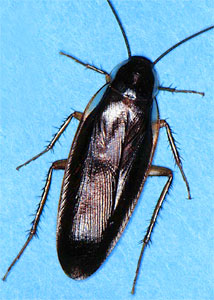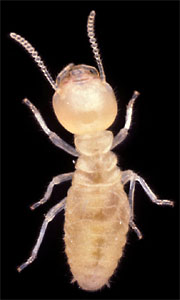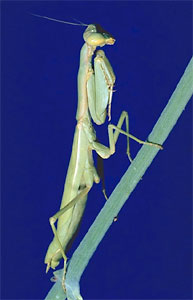Dictyoptera



This tree diagram shows the relationships between several groups of organisms.
The root of the current tree connects the organisms featured in this tree to their containing group and the rest of the Tree of Life. The basal branching point in the tree represents the ancestor of the other groups in the tree. This ancestor diversified over time into several descendent subgroups, which are represented as internal nodes and terminal taxa to the right.

You can click on the root to travel down the Tree of Life all the way to the root of all Life, and you can click on the names of descendent subgroups to travel up the Tree of Life all the way to individual species.
For more information on ToL tree formatting, please see Interpreting the Tree or Classification. To learn more about phylogenetic trees, please visit our Phylogenetic Biology pages.
close boxDiscussion of Phylogenetic Relationships
Boudreaux (1979), Thorne & Carpenter (1992), DeSalle et al. (1992), Kambhampati (1995), and Wheeler et al. (2001) argue for a sister group relationship between mantids and cockroaches:
====== Isoptera (termites)
===|
| === Mantodea (mantids)
===|
=== Blattaria (cockroaches)
Hennig (1981), Kristensen (1995), Klass (1998), and Lo et al. (2000) favor a sister group relationship between termites and cockroaches:
====== Mantodea (mantids)
===|
| === Isoptera (termites)
===|
=== Blattaria (cockroaches)
The monophyly of cockroaches has often been questioned, and many authors believe that the Blattaria are paraphyletic with respect to the Isoptera. In particular, a sister group relationship between Isoptera and Cryptocercus wood roaches has often been suggested (e.g., McKittrick 1964, Hennig 1981, Lo et al. 2000).
References
Bandi, C., M. Sironi, G. Damiani, L. Magrassi, C. A. Nalepa, U. Laudani, and L. Sacchi. 1995. The establishment of intracellular symbiosis in an ancestor of cockroaches and termites. Proceedings of the Royal Society of London Series B 259(1356):293-299.
Boudreaux, H. B. 1979. Arthropod Phylogeny with Special Reference to Insects. New York, J. Wiley.
Deitz, L. L., C. Nalepa, and K. D. Klass. 2003. Phylogeny of the Dictyoptera re-examined (Insecta). Entomologische Abhandlungen (Dresden) 61(1):69-91.
Desalle, R., J. Gatesy, W. Wheeler, and D. Grimaldi. 1992. DNA sequences from a fossil termite in Oligo-Miocene amber and their phylogenetic implications. Science 257(5078):1933-1936.
Eggleton, P. 2001. Termites and trees: a review of recent advances in termite phylogenetics. Insectes Sociaux 48:187-193.
Grandcolas, P. and P. Deleporte. 1996. The origin of protistan symbionts in termites and cockroaches: A phylogenetic perspective. Cladistics 12(1):93-98.
Grimaldi, D. 1997. A fossil mantis (Insecta: Mantodea) in Cretaceous amber of New Jersey, with comments on the early history of the Dictyoptera. American Museum Novitates 3024:1-11.
Hennig, W. 1981. Insect Phylogeny. New York, J. Wiley.
Jarzembowski, E. A. 1994. Fossil Cockroaches or Pinnule Insects? Proceedings of the Geologists' Association 105:305-311.
Kambhampati, S. 1995. A phylogeny of cockroaches and related insects based on DNA sequence of mitochondrial ribosomal RNA genes. Proceedings of the National Academy of Sciences (USA) 92:2017–2020.
Kevan, D. K. M. 1977. The higher classification of the orthopteroid insects. Mem. Lyman Entomol. Mus. Res. Lab. 4 (Spec. Publ. No. 12):1-79.
Klass, K. D. 1997. The external male genitalia and the phylogeny of Blattaria and Mantodea. Bonner zoologische Monographien 42:1-341.
Klass, K. D. 1998. The ovipositor of Dictyoptera (Insecta): Homology and ground-plan of the main elements. Zoologischer Anzeiger 236 (2-3):69-101.
Klass, K. D. 1998. The proventriculus of the Dicondylia, with comments on evolution and phylogeny in Dictyoptera and Odonata (Insecta). Zoologischer Anzeiger 237(1):15-42.
Klass, K. D. 1999. The pregenital abdomen of a mantid and a cockroach: Musculature and nerve topography, with comparative remarks on other Neoptera (Insecta: Dictyoptera). Deutsche Entomologische Zeitschrift 46(1):3-42.
Klass, K. D. 2003. Relationships among the principal lineages of Dictyoptera inferred from morphological data. Entomologische Abhandlungen (Dresden) 61(2): 134-137.
Klass, K. D. , C. Nalepa, and N. Lo. 2008. Wood-feeding cockroaches as models for termite evolution (Insecta: Dictyoptera): Cryptocercus vs. Parasphaeria boleiriana. Molecular Phylogenetics and Evolution 46(3):809-817.
Kristensen, N. P. 1995. Forty years' insect phylogenetic systematics. Zoologische Beiträge NF 36(1):83-124.
Lo, N. 2003. Molecular phylogenetics of Dictyoptera: insights into the evolution of termite eusociality and bacterial endosymbiosis in cockroaches. Entomologische Abhandlungen (Dresden) 61(2): 137-138.
Lo, N., C. Bandi, H. Watanabe, C. Nalepa, and T. Beninati. 2003. Evidence for cocladogenesis between diverse dictyopteran lineages and their intracellular endosymbionts. Molecular Biology and Evolution 20(6):907-913.
Lo, N., G. Tokuda, H. Watanabe, H. Rose, M. Slaytor, K. Maekawa, C. Bandi, and H. Noda. 2000. Evidence from multiple gene sequences indicates that termites evolved from wood-feeding cockroaches. Current Biology 10(13):801-804.
McKittrick, F. A. 1964. Evolutionary study of cockroaches. Cornell University Agricultural Experiment Station Memoirs 389:1-197.
Nalepa, C. A. and C. Bandi. 2000. Characterizing the ancestors: Paedomorphosis and termite evolution. Pages 53-75 in Termites: Evolution, Sociality, Symbiosis, Ecology. T. Abe, D. E. Bignell, and M. Higashi, eds. Kluwer Academic Publishing, Dordrecht.
Nalepa, C. A., D. E. Bignell, and C. Bandi. 2001. Detritivory, coprophagy, and the evolution of digestive mutualisms in Dictyoptera. Insectes Sociaux 48:194-201.
Thorne, B. L. 1990. A case for ancestral transfer of symbionts between cockroaches and termites. Proceedings of the Royal Society of London Series B 241:37–41.
Thorne, B. L. and J. M. Carpenter. 1992. Phylogeny of the Dictyoptera. Systematic Entomology 17:253–268.
Ware, J. L., J. Litman, K.-D. Klass, and L. A. Spearman. 2008. Relationships among the major lineages of Dictyoptera: the effect of outgroup selection on dictyopteran tree topology. Systematic Entomology 33(3):429–450.
Wheeler, W. C., M. Whiting, Q. D. Wheeler, and J. M. Carpenter. 2001. The phylogeny of the extant hexapod orders. Cladistics 17:113-169.
Vrsansky, P. 2003. Unique assemblage of Dictyoptera (Insecta - Blattaria, Mantodea, Isoptera) from the Lower Cretaceous of Bon Tsagaan Nuur in Mongolia. Entomological Problems 33(1-2): 119-151.
Title Illustrations

| Scientific Name | Parcoblatta pennsylvanica (Blattaria) |
|---|---|
| Comments | Pennsylvania wood cockroach |
| Specimen Condition | Live Specimen |
| Sex | Male |
| Copyright | © Department of Entomology, University of Nebraska-Lincoln |
| Scientific Name | Coptotermes formosanus (Isoptera) |
|---|---|
| Comments | Formosan subterranean termite |
| Acknowledgements | Courtesy InsectImages.org (#0014115) |
| Specimen Condition | Live Specimen |
| Life Cycle Stage | Worker |
| Source Collection | Bugwood Network/Forestry Images |
| Copyright | © Gerald J. Lenhard |
| Scientific Name | Stagmomantis carolina |
|---|---|
| Comments | Carolina mantis |
| Creator | Marguerite Gregory |
| Specimen Condition | Live Specimen |
| Source Collection | CalPhotos |
| Copyright |
© 1999 California Academy of Sciences

|
About This Page
Correspondence regarding this page should be directed to David R. Maddison at
Page copyright © 2002 David R. Maddison
 Page: Tree of Life
Dictyoptera.
The TEXT of this page is licensed under the
Creative Commons Attribution License - Version 3.0. Note that images and other media
featured on this page are each governed by their own license, and they may or may not be available
for reuse. Click on an image or a media link to access the media data window, which provides the
relevant licensing information. For the general terms and conditions of ToL material reuse and
redistribution, please see the Tree of Life Copyright
Policies.
Page: Tree of Life
Dictyoptera.
The TEXT of this page is licensed under the
Creative Commons Attribution License - Version 3.0. Note that images and other media
featured on this page are each governed by their own license, and they may or may not be available
for reuse. Click on an image or a media link to access the media data window, which provides the
relevant licensing information. For the general terms and conditions of ToL material reuse and
redistribution, please see the Tree of Life Copyright
Policies.
Citing this page:
Tree of Life Web Project. 2002. Dictyoptera. Version 01 January 2002 (temporary). http://tolweb.org/Dictyoptera/8253/2002.01.01 in The Tree of Life Web Project, http://tolweb.org/











 Go to quick links
Go to quick search
Go to navigation for this section of the ToL site
Go to detailed links for the ToL site
Go to quick links
Go to quick search
Go to navigation for this section of the ToL site
Go to detailed links for the ToL site